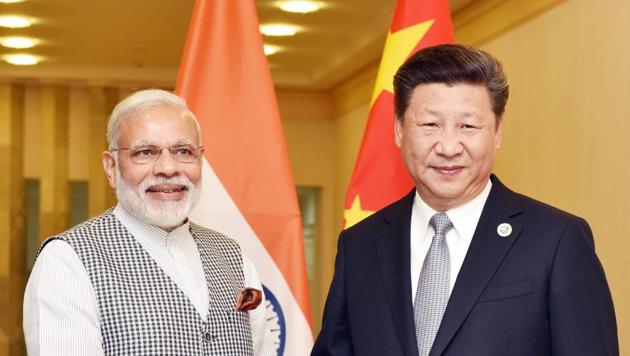In 2018, India must balance the demands of the neighbourhood against the compulsions of a global role
India must not let China dictate the contours of our neighbourhood policy. India can leverage assets in the subcontinent that are unmatched by any other country
India’s emergence as a great regional and global power is predicated on how effectively it manages its own periphery. If its neighbours are afflicted with political turmoil or economic crises, these inevitably spill across India’s borders demanding both political attention and resources. If another major power, inimical to India’s interests, entrenches itself in any neighbouring state, then India will inevitably become preoccupied with coping with the threat . In these circumstances, an expansive foreign policy, such as articulated through Act East, Development Partnership with Africa or the more recent Quadrilateral among India-Japan-Australia and U.S., will suffer from the constant pulls and pressures within India’s own neighbourhood. India’s economic resources and diplomatic firepower are limited. The challenge in 2018 will be to balance the demands of the neighbourhood against the compulsions of a global role. Strategic thinking requires a careful assessment of where the focus must lie currently. There should also be a major review of neighbourhood policies to determine what has succeeded and what has failed so far and why.

Over the past decade a significant asymmetry of power has emerged between India and China. This has translated into a much more active and interventionist Chinese role in each of our neighbouring countries. Chinese economic and security presence in Pakistan has been greatly enhanced thanks to the China-Pakistan Economic Corridor (CPEC). Pakistan has a powerful Chinese shield behind which it can pursue even more hostile policies towards India, including cross-border terrorism. In Nepal, China has actively intervened in domestic politics to enable a China-friendly government to take power. This, in turn, will hasten infrastructure and connectivity links across the Tibet-Nepal border. The erstwhile forbidding Himalayan fortress has been breached at multiple locations. We are aware of the Hambantota saga in Sri Lanka and the leasing of an entire atoll to Chinese interests by the Maldives. Both island countries are critical to Indo-Pacific security but are drifting into a closer embrace with China. Both are also negotiating free trade agreements with China, even while Sri Lanka resists a Comprehensive Economic Partnership with India. Bangladesh, too, is being tempted by generous Chinese offers for infrastructural development. More recently, it was China which brokered an agreement on the Rohingya issue between Myanmar and Bangladesh, a good-offices role that should naturally have been India’s. And in Bhutan, the Doklam incident brought on apprehensions of the country being drawn into an India-China conflict. There are Bhutanese citizens who would like to derive benefits from China’s infrastructure assistance and trade across the Bhutan-Tibet border. This is the landscape which will test Indian policy-makers in the coming year.
In 2018,we must translate the rhetoric of according priority to the neighbourhood into sustained practice. There has to be continuous and high-level political engagement with each of our neighbours. We may need to appoint several special envoys, perhaps at the minister of state level to remain engaged with not only the political leadership but also with opinion makers and civil society in neighbouring countries. A high-level empowered committee, led by the ministry of external affairs, should be authorised to consider and implement their recommendations . The divisions in the ministry of external affairs and the diplomatic missions responsible for the neighbourhood will need to be significantly strengthened in order to support the expanded level of engagement.
Delays in execution of commitments made to neighbours has been a perennial shortcoming. India’s credibility suffers as a result, particularly in comparison to China’s record. This is a governance issue but it is unlikely that systemic change will overcome this in the foreseeable future. It may be necessary to create special vehicles to undertake projects in neighbouring countries in view of their critical importance.
India has a large and expanding market and regional trade enjoys the advantage of proximity. In principle, this should translate into lower prices for goods traded across subcontinental borders. This can be leveraged only if there is efficient cross-border physical connectivity and procedures that allow the swift movement of goods and peoples across borders. Despite this being an obvious and urgent requirement there has been very slow progress. Furthermore, India is the key transit country for virtually all subcontinental trade. If it has to emerge as the transport node for the region, it must aspire to become the most efficient, cost effective and convenient transport corridor, opening up its highways, railways, waterways and ports to all its neighbours. A successful strategy must rest on leveraging the very scale and dynamism of its economy to become the economic and commercial partner of choice for its neighbours.
Every neighbour will be tempted to use the so-called Chinese card to extract concessions from India. India should not fall victim to a fear of losing ground to China. We must not let China dictate the contours of our neighbourhood policy. India can leverage assets in the subcontinent that are unmatched by any other country. A long-term approach will entail a careful accounting of these assets as well as our vulnerabilities, including policy shortcomings which must be overcome. This may be reviewed and refined as the situation evolves. There will be crises which may need swift and even unpleasant responses but the larger picture should never fall through the cracks of tactical compulsions.
Shyam Saran is a former Foreign Secretary and a Senior Fellow, CPR
The views expressed are personal



